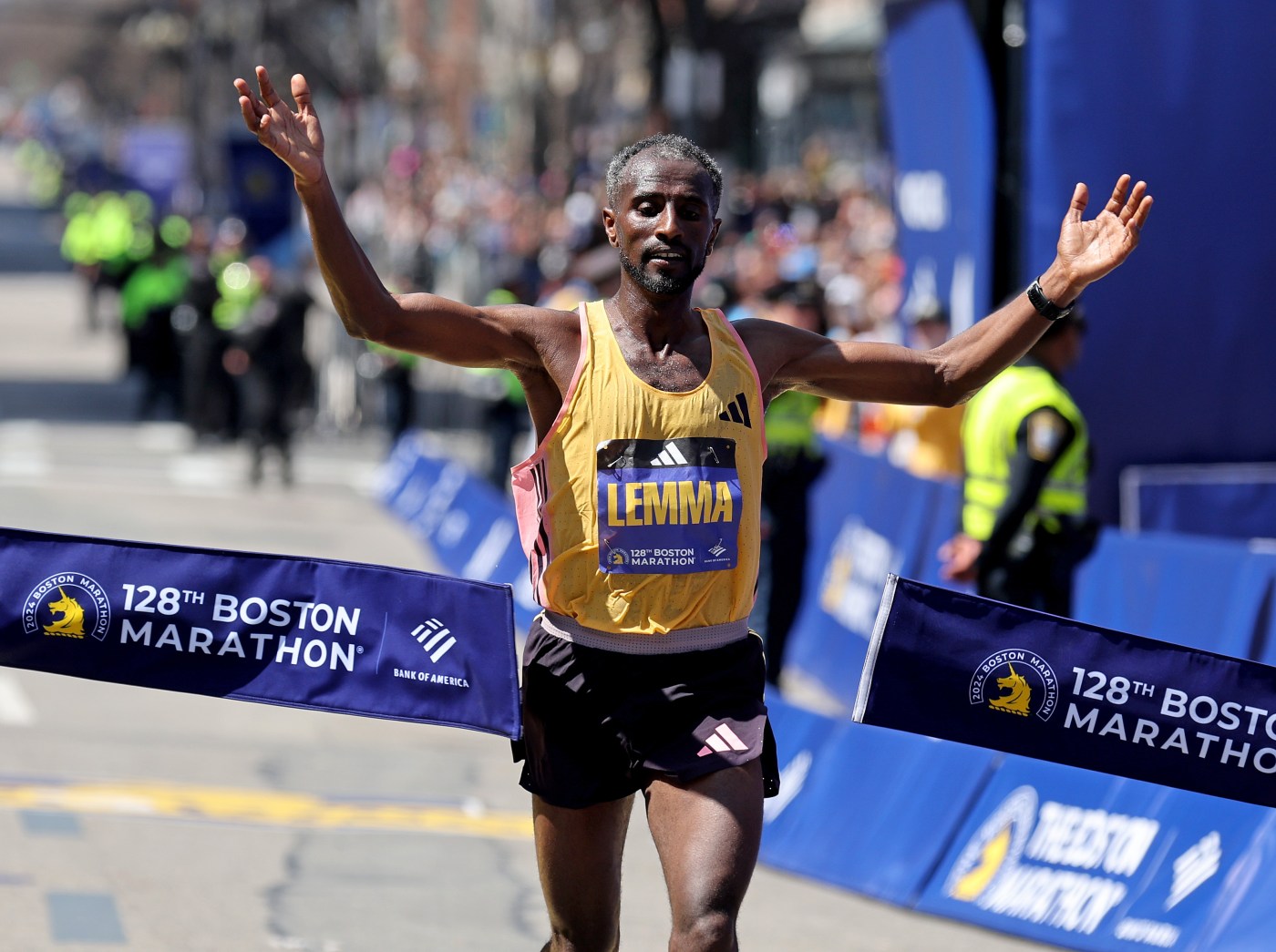
Ethiopian Sisay Lemma runs away to victory in the Boston Marathon
Sisay Lemma of Ethiopia opened a big early lead and cruised to victory in the men’s professional race during Monday morning’s running of the 128th BAA Boston Marathon.
Lemma broke the tape in 2:06:17 — the 10th-fastest time in BAA history — to become the first Ethiopian champion since Lemi Berhanu Hayle in 2016. Lemma entered the race with the fastest marathon time in the field; he clocked 2:01:48 at Valencia, Spain, in 2023.
“I came today and started early fast and I was able to win,” said Lemma. “When I was running in Valencia it was flat and my time was good.
“My play when I came here was to run under two hours and two minutes. Since the race was very hard, I was not able to do that but I’m very glad that I finished.”
Lemma’s compatriot, Mohamed Esa put on a burst of speed on Hereford Street to take second in 2:08:58.
“I am very pleased that I came in second and in the last five kilometers I pushed very hard,” said Esa. “I was able to come in second and I am happy with that.”
Two-time champion Evans Chebet of Kenya took third in 2:07:22, a time and finish that likely compromised his plans to compete in the Summer Olympic Games in Paris. Chebet was looking to become the fifth male runner to win three straight Boston Marathons.
“I am very happy and very pleased and I tried to win (a third) race but it is not easy,” said Chebet. “Maybe next year I will come back again and try to win.”
C.J. Albertson of Fresno, Calif., was the top American, finishing seventh with a time of 2:09:53. Albertson enjoyed the best finish and fastest time in his fourth straight run at Boston.
Yuma Morij of Japan assumed the rabbit role by sprinting from the starting line to set a fast pace for the favorites in a tight pack of 12 runners. Morij prudently retreated back to the pack and let Lemma assume control of the pace.
Lemma had opened a sizable lead on the pack by the 5-mile marker and was running at course-record pace on the small downslope to the Framingham Flats. Lemma had put the pack out of sight as he cruised past Lake Cochituate, the most scenic stretch of the race, and through a bustling crowd at Natick Center.
“I was checking my watch because I was trying to see how long I had run,” said Lemma. “Until halfway through I was running very hard but after that it was getting harder and harder to run.”
Lemma maintained form on the steep descent at Lower Falls, around the Firehouse Turn and onto the first of the four Newton hills. In two of his previous three Boston runs, Lemma’s race fell apart on Heartbreak Hill and he ended with a DNF in 2022 and 30th place in 2019. Lemma’s time between mile markers 20 and 21 that includes Heartbreak Hill was 5:27.
Lemma scaled back from his earlier record pace after clearing Heartbreak Hill, but he was still in command over the friendly final 10K to Copley Square.
“I am very happy that I won today because I have dropped out of the race before,” said Lemma. “Today I won and I was happy to redeem myself and I am very happy.”
Chebet and Kenyan John Korir were pushing each other trying to reduce Lemma’s two-minute lead on the Brookline stretch through Coolidge Corner. Chebet had Lemma in his crosshairs at Kenmore Square but it was too late in the race to mount a serious challenge.
Marcel Hug of Switzerland captured his seventh men’s wheelchair title with a wire-to-wire record run in 1:15:33. Hug obliterated the record of 1:17:06 he set a year ago under wet and windy conditions.
“It was an incredible race and from the beginning tried to go fast downhill as possible because the weather conditions were near perfect,” said Hug. “I really tried to have a fast time and after the first downhills I had a gap and was pushing as hard as possible.”
Hug had a four-minute lead on the field when he overshot the Firehouse Turn onto Commonwealth Ave and collided with the barrier. Hug was up in an instant and was back on pace as he ventured onto the first of the Newton hills.
“I had a good rhythm until I crashed and I got back on the course and moved forward,” said Hug. “At the fire station, I had a high speed at the corner and tried to steer and I still have to analyze what really happened.
“My guess is that I had too much pressure and too much weight on my hand on the steering and I didn’t steer properly. It was a little bit too late steering and hit the barriers. Luckily, I didn’t fall out of the racing chair.”


